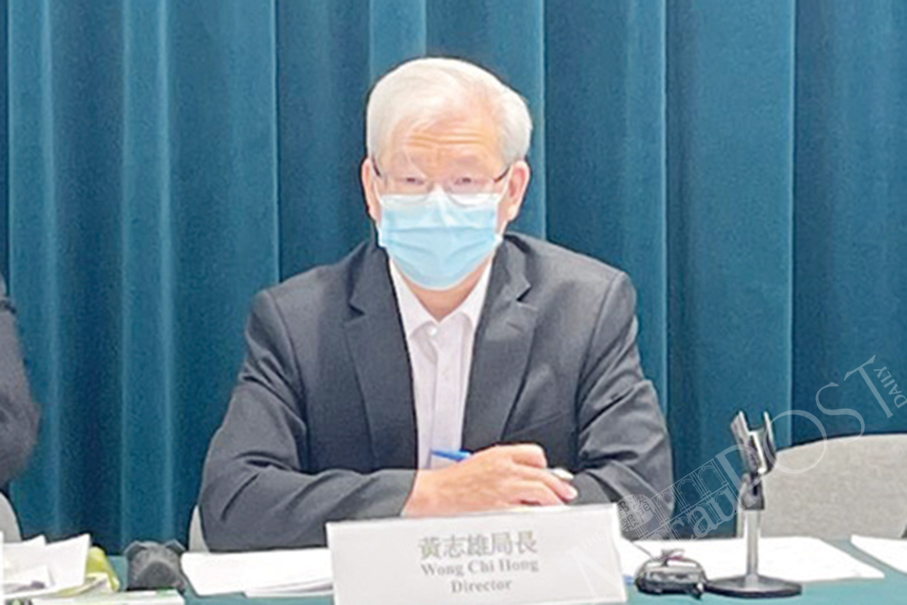Interview by Tony Wong
Macau Taxi Drivers Mutual Help Association President Tony Kuok Leong Son said yesterday that the government’s upcoming granting of 300 new common taxi-vehicle licences would be able to meet residents and visitors’ rising demand for taxi rides in the near future, insisting that an excessive number of common taxi-vehicle licences would not make it easier for prospective passengers to hail a taxi because of the city’s limited number of cabbies.
Kuok made the remarks in an interview with The Macau Post Daily at his association’s office near the Pak Wai Garden residential estate on Avenida do Conselheiro Ferreira de Almeida.
Common taxis – as opposed to radio taxis – are colloquially known as “black taxis” (“hak dik” in Cantonese).
Kuok noted that the number of black taxis has been decreasing as more and more common taxi licences have expired over the past few years.
The last time that the government launched a public tender for new black taxi licences was in 2018, when 100 new licences valid for eight years were bid for.
The Transport Bureau (DSAT) said in a statement last month that as of the middle of last month, Macau had a total of 1,602 taxis, comprising 1,302 black taxis and 300 radio taxis.
Secretary for Transport and Public Works Raimundo do Rosário told reporters last week that the government will launch a public tender later this year for 300 new common taxi-vehicle licences valid for eight years.
Kuok noted yesterday that the city had nearly 1,600 black taxis at its peak, a period shortly before and after the onset of the COVID-19 pandemic in early 2020, after which the number of black taxis has cumulatively dropped by around 300 over the past three years as more and more licences have expired.
Macau confirmed its first COVID-19 case on January 22, 2020. The local government discontinued its long-running dynamic zero-COVID approach in early December last year.
Kuok acknowledged that with the post-pandemic rising number of visitors and 300 fewer taxis compared to the taxi sector’s peak, it is currently difficult for locals and visitors alike to hail a taxi.
Kuok noted that despite the declining number of common taxis during the COVID-19 pandemic, it was then easy to hail a taxi because of the very low number of prospective passengers during the three-year period.
According to Kuok, the government initially planned to launch a public tender in 2020 for 200 new common taxi-vehicle licences, but later cancelled it because of the significant decrease in the number of taxi passengers resulting from the COVID-19 pandemic.
According to DSAT data available on its website, Macau’s number of black taxis stood at 1,597, 1,599 and 1,599 respectively in the first, second and third quarter of 2020. The city saw a significant drop in the number of black taxis in the third quarter of 2021 when there were 1,436, a decrease of 112 from 1,548 in the previous quarter. Since then, the number of black taxis has continuously been declining, and there were only 1,322 in the last quarter, according to the DSAT data.
Kuok underlined yesterday that after the number of common taxis has returned to the peak level recorded a few years ago, it would be enough to meet the city’s current demand for taxi rides, particularly when considering that the city’s current daily average number of visitor arrivals has only recovered to around 60 percent to 70 percent of the level recorded in the pre-pandemic year of 2019.
Kuok, who has headed the association since 1994, said that the summer holiday period normally sees a higher number of prospective taxi passengers every year, adding that’s why currently residents may find it particularly difficult to hail a taxi.
Kuok’s association was established in 1986.
Kuok also underlined that the number of common taxis could not be raised excessively because of the city’s limited number of cabbies, adding that while more and more older drivers have retired, only a small number of young people have been willing to join the taxi sector in recent years.
Kuok said that if the number of black taxis was increased too much, there would be an insufficient number of cabbies to drive the respective number of taxis.
Kuok noted that as the city currently has just around 1,300 taxis, some of those who previously worked as a cabbie were now unable to get a taxi to drive. He said that the upcoming 300 additional common taxi-vehicle licences would solve the issue.
Kuok said that while over 10,000 people have obtained a taxi-driving licence, more than half of them have never worked as a cabbie.
Kuok said that only around 4,000 people had paid the annual fee of 100 patacas to the government this year for their taxi-driving licences to remain valid, adding that some of them actually have never worked as a cabbie.
The current law regulating the city’s taxi sector took effect in June 2019, according to which only companies are allowed to bid for a licence to operate common taxis.
Before the current taxi law came into force, common taxi-vehicle licences were granted to individuals.
According to the current taxi law, a single company is allowed to hold up to 300 taxi-vehicle licences.
The government’s upcoming public tender to be launched later this year for 300 additional common taxi-vehicle licences will be the first tender since the current taxi law took effect in 2019.
Kuok, who started to work as a cabbie in 1975, also said yesterday that he expected the upcoming public tender to primarily attract “large” companies. Kuok said he expected the government to list various types of requirements in its upcoming bidding regulations, such as requiring the potential bidders to be able to provide a sufficient number of parking spaces for taxis in indoor carparks.
Kuok, who stopped driving a taxi a decade or so ago, said that he agreed with the government’s view that only allowing companies to bid for taxi-operating licences would enable it to better regulate the city’s taxi sector.
Macau Taxi Drivers Mutual Help Association President Tony Kuok Leong Son talks during yesterday’s interview with The Macau Post Daily at his association’s office.
– Photo: Tony Wong








